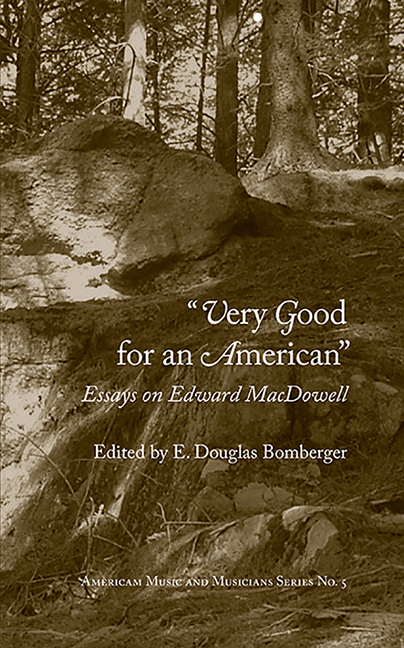Book contents
- Frontmatter
- Table of Contents
- Illustrations
- Contributors
- Acknowledgments
- Introduction: MacDowell at 150
- Edward MacDowell and the Society of Friends
- Historical Concerts in New York City, 1860-1876: An Approximation
- “No MacDowell, No Carreño”: Teresa Carreño's Contributions to the Dissemination of Edward MacDowell's Piano Music
- MacDowell, Liszt, and the Symphonic Tone Poem
- Wagnerian Influence and Motives in the Works of Edward MacDowell
- “On Sundays there was the music …” George Whitefield Chadwick between symphony and organ
- MacDowell vs. Butler: The “Idealist” Professor and the Administrator of “Materialism”
- Parallels in the Careers of Edward A. MacDowell and Chou Wen-chung
- American Bayreuth: The 1910 Peterborough Pageant and the Genesis of the MacDowell Colony
- Selective Bibliography
- Index
Introduction: MacDowell at 150
- Frontmatter
- Table of Contents
- Illustrations
- Contributors
- Acknowledgments
- Introduction: MacDowell at 150
- Edward MacDowell and the Society of Friends
- Historical Concerts in New York City, 1860-1876: An Approximation
- “No MacDowell, No Carreño”: Teresa Carreño's Contributions to the Dissemination of Edward MacDowell's Piano Music
- MacDowell, Liszt, and the Symphonic Tone Poem
- Wagnerian Influence and Motives in the Works of Edward MacDowell
- “On Sundays there was the music …” George Whitefield Chadwick between symphony and organ
- MacDowell vs. Butler: The “Idealist” Professor and the Administrator of “Materialism”
- Parallels in the Careers of Edward A. MacDowell and Chou Wen-chung
- American Bayreuth: The 1910 Peterborough Pageant and the Genesis of the MacDowell Colony
- Selective Bibliography
- Index
Summary
A composer's reputation is dependent on much more than his talent and inspiration. After his death, when he can no longer influence public perception directly, his critics and admirers shape that perception for him. In the introduction to his magisterial biography of Felix Mendelssohn, R. Larry Todd illustrates how such factors as anti-Semitism and anti-Victorianism can change perceptions of a composer's music in subtle and not-so-subtle ways. Kate Hevner Mueller's study of the changing repertoires of American symphony orchestras demonstrates that popularity with conductors and audiences is by no means stable over time. Few composers vacillated more strongly between adulation and excoriation than MacDowell, and his meteoric rise and subsequent fall shed light on American musical aspirations in the nineteenth and twentieth centuries. To set the stage for the essays in this collection, it will be useful to consider the reception history of his works from his period of greatest fame to his 150th birthday in 2010.
Born in 1860 in New York City, MacDowell grew up in a Quaker family and pursued his early music studies with teachers from Latin America. MacDowell moved to Europe as a fifteen-year old to further his musical training, spending the next twelve years in France and Germany first as a student and then as a young professional. Initially he pursued a career as a concert pianist, but during his last four years in Germany, his time was devoted almost entirely to composition. In addition to numerous piano works, he published his first orchestral works at this time. In the summer of 1888, he and his wife Marian moved to Boston, where he reactivated his performing career, accepted students in piano and composition, and pursued his dream of achieving fame as a composer.
The timing of his return home could not have been better. MacDowell had published a substantial number of piano, vocal, and orchestral works with major German publishing firms, and his music had been played by European orchestras. MacDowell's family friend Teresa Carreño was also influential in bringing his music before the public. To American concert promoters, MacDowell was ideal—a native-born American whose works had already been given the stamp of European approval.
- Type
- Chapter
- Information
- Very Good for an AmericanEssays on Edward MacDowell, pp. 1 - 12Publisher: Boydell & BrewerPrint publication year: 2017



